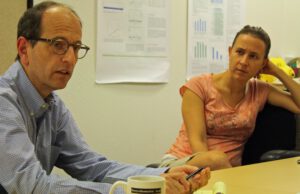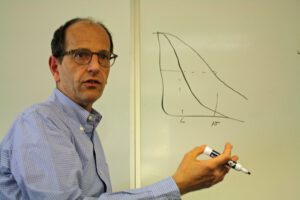On a recent visit to 23andMe George Demetri –a physician and scientist who is an unpaid advisor to our Sarcoma research initiative – sat down for a short interview after talking to our team.
Demetri, who is also the director of the Dana-Farber Center for Sarcoma and Bone Oncology, said he has a lot to be optimistic about in the study of sarcoma. Individually, these are rare kinds of cancers that affect bone, cartilage, muscle, and other soft connective tissue in the body.
 Dr. George Demetri and 23andMe’s CEO Anne Wojcicki
Dr. George Demetri and 23andMe’s CEO Anne Wojcicki
Genetics often triggers different sarcomas, but, as with most cancers, there seldom is a single cause. This makes treating sarcoma that much more difficult. Research into sarcoma, like other rare diseases, is stymied by how rare these cancers are, but Demetri’s work at the Dana-Farber Center offers much to be hopeful about.
Demetri, who has had his share of practice-changing clinical breakthroughs, mostly notably with treating gastrointestinal stromal tumors, is excited by some of the preliminary research 23andMe is already compiling around our Sarcoma research community. He said the model for our research platform – crowd-sourced, Internet-based, and web-driven genetic studies – is something he has long envisioned as a way to improve medical research and treatment.
23andMe: You anticipated using the Internet to connect patients to doctors and researchers long before 23andMe created its Sarcoma Community. Where did that idea come from, and how does 23andMe’s work mesh with what you’d hope to see?
Demetri: For me, the idea of using the Internet was about finding the right patients with the disease under interest because it was very clear that the tools we use to diagnose a disease are not sufficiently powerful … cancer, it’s not one disease. Sarcomas under the microscope look very different. When we started diving into the chromosomes, they were completely different. And when we started diving into the genetics, they couldn’t be more different … When you peer into that looking glass, you see a thousand different kinds of sarcomas. You run into a problem if they are only one percent of all cancers and you have 1,000 different diseases; there are not a lot of people with any one kind of those cancers … You have to do the E-Harmony trick. You have to match the right patients to the right drugs. 23andMe is the perfect tool for that.
Nine out of ten cancer drugs we have today fail in clinical trails and that’s because nobody’s paying attention to this important matching of what’s driving the patient with the cancer to the drug that works for that cancer. To do that you need to put another filter on the traditional clinical trials methodology where you don’t just take everybody who walks in the door with a given type of cancer. Instead, you take the patients with the right kind of genetics, and you actually select for them.It’s the same kind of issue that patients have. They want their medicine personalized. And you know, we hear a lot of backlash about this in the medical community where they are saying:
“You guys in academia talk a lot about personalized medicine. Well, I’m very personalized. I treat my patients as individuals.”
And you know they do. They do the best they can with old technology and old diagnostics, but the truth is our technology has moved beyond that, and patients want access to it.
23andMe: What might the work on Sarcomas mean for other kinds of research?
Demetri: Sarcomas tend to be driven by one dominant pathway, where if you shut it off, the cancer gets better. GIST (gastrointestinal stromal tumors) is a great example of that. But more common cancers are probably driven by two, or maybe three, mutated pathways or different dysregulated pathways – kind of like HIV. We didn’t see people living with HIV for years, and, years, and years until we got to triple therapy. So the challenge for us now in cancer is how to identify the right molecular pathways, do the clinical trials, and, as quickly as possible, move from using a single targeted drugs to giving triple therapies.
23andMe: More than 800 people are enrolled in our Sarcoma Community and are heading to 1,000. What is the significance of having that many people with Sarcoma in a research cohort?

Demetri: In research, in general, the quality of the community and its engagement are important. It’s not just the number. But it is incredibly helpful to be able to dialogue back and forth between patients, doctors, and researchers. Patients also want to be able to reach out to other patients. What I see in this tool is that possibility.
Having patients participate as part of the research will teach us a lot. It’s to the patient’s advantage to help us hone the data we’re collecting and to have their voices heard. Simply knowing things like, ‘How did you feel taking this drug?’ That’s important. I think patients are frustrated that the health care system doesn’t already use that kind of data, their data, in an aggregated way.
23andMe: You are an excellent combination of someone who is both very realistic and optimistic. What would you tell someone today who was just diagnosed with Sarcoma?
Demetri: Sarcoma is a scary diagnosis, but some may proceed with a nihilism that’s unwarranted. That nihilism is the first thing we’ve tried to counteract in the last decade. I think the important thing with this is today, half of all patients will be cured with conventional modalities. That’s terrific. That’s number one, and even when we have somebody who doesn’t currently have the potential of being cured, I’ve been lucky enough to be part of developing drugs that made people who thought that they maybe had only had six weeks to live to still be alive 11 years later now. That is life-changing. That is a transformational kind of research. And I’ve seen the power of that kind of research. I tell my patients I’m going to help them make decisions so that they buy as much time as possible because we never know in research when we’re going to make the next major breakthrough that will make an incurable disease curable or a fatal one into one that will be manageable.



